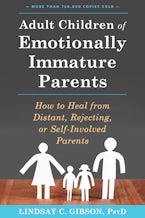By Lindsay C. Gibson, PsyD, author of Adult Children of Emotionally Immature Parents
In everyday life, setting boundaries usually doesn’t come down to life and death. We can skate around our incompatibilities and mostly look the other way so others can live life as they see fit. But the pandemic has turned up the heat under our differing worldviews and made it hard at times to be respectful adults with each other. This can be especially difficult when you’re dealing with an emotionally immature parent (EIP) who doesn’t see things your way.
Emotional immaturity by definition means that a person is very self-focused and lacks the empathy to see things from another person’s point of view. It’s often impossible for them to take another person’s opinion seriously, and they may try to get their way through emotional coercions such as guilt, shame, or outright hostility. Differences of opinion may be seen as affronts, as signs of disrespect or even a lack of love. Instead of showing curiosity leading to a respectful discussion, an EI parent may take personally your limit-setting during COVID-19 and feel hurt that you would see things so differently.
Instead of respecting your individual tolerance for risk, they may react as if your concern is an unnecessary and baseless impediment to what they want to do.
The pandemic throws a spotlight on what happens in your family when someone wants to say no. You might feel pressured to tolerate more exposure than you want, or you may feel disdained if your mask and hygiene practices differ from theirs. It may be hard to hang onto a friendly attitude when an insistent parent not only disagrees with you but acts as though you’re being unreasonable or even ridiculous. That’s hard to take when the issue is as crucial as safety and survival. But it might feel familiar, since emotionally immature parents have a hard time taking seriously anything that doesn’t match their expectations.
This would be an easy issue to solve if explaining your position were all that was needed. Many people try to do just that—giving information, citing statistics, and otherwise defending the merit of their position. But this approach usually doesn’t work with EIPs because they find it hard to imagine other people’s inner experience. To them, it’s a foreign idea that a differing opinion could be as valid and respect worthy as their own. These individuals focus on their wishes first, see themselves as right, and use emotional pressure to get their way. For them, disagreement is not about differing viewpoints, it’s about loyalty or betrayal. If you love them, you will mirror their wishes, and for EIPs, love means giving them the last word. Attempting to talk it out with them—while a sensible first step—doesn’t make them more receptive.

Such situations are excellent opportunities to practice sticking to your position without becoming defensive or angry yourself. You may be in the habit of avoiding confrontations with EI parents because you find them intimidating, or because it’s frustrating not to be respected for your own position. But in this case, you know you’re not going to be pressured out of what you believe to be safe, right? The pandemic has created a uniquely justified situation wherein you can say no repeatedly, with clear resolution, to anyone who pressures you to compromise your comfort level.
Under pandemic conditions, you now have external validation for whatever limits you want to set regarding social contact. It’s a great time to get stronger in stating your preferences—with explanation but without apology—and also to tolerate the tension and discomfort that pressure you to smooth the EIP’s ruffled feathers. You get to practice upholding your preferences without taking responsibility for their disapproval. You can just let yourself be, well, different from them.
The pandemic is giving us all the opportunity to stand up for ourselves. The pandemic teaches us that the world doesn’t end when you have to say no to someone who disagrees with your reasons. You may find yourself setting limits in ways you never did before. You may discover that even if some people are displeased with you, you still have the right to your no.
If you have been intimidated or pressured by an opinionated person in your family or close circle, setting limits during COVID-19 may give you quite a workout. But the unexpected benefit from this pandemic might be that you end up a stronger individual than you were before, someone who now feels perfectly entitled to see things differently.
Lindsay C. Gibson, PsyD, is a clinical psychologist in private practice who specializes in individual psychotherapy with adult children of emotionally immature parents. She is author of Adult Children of Emotionally Immature Parents.



 Part 2: What to Do When a Client Is Participating in Self-Judgment?
Part 2: What to Do When a Client Is Participating in Self-Judgment?